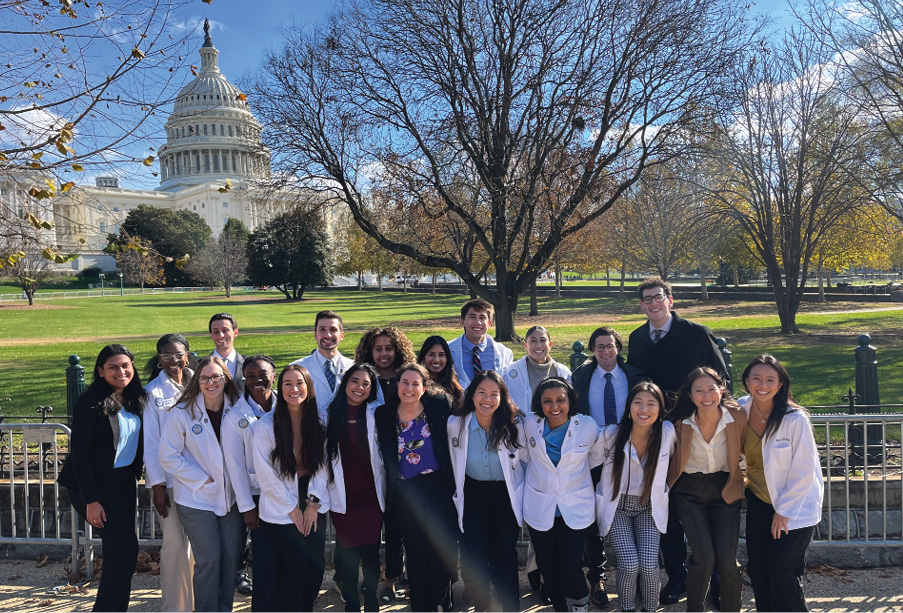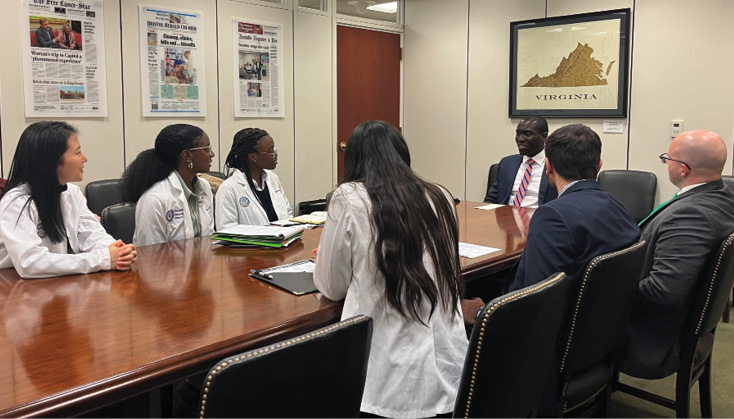Law students and future doctors learn about the legal challenges they may face in special seminar

Georgetown University medical and law students join forces to visit Capitol Hill as advocates. Photo by Abigail Sweeney.
A 27-year-old man arrives at an emergency room with pain in his chest and left arm, concerned he’s having a stroke. He has a history of methamphetamine, heroin and alcohol abuse. He’s facing eviction, stressed and admits he recently wished himself dead. An electrocardiogram shows an elevated heart rate. The man is diagnosed with acute anxiety. Once calmed, he’s released and told to call his primary care physician the next day. No orders for a follow-up call with a mental health professional are written.
The next day, the man dies by suicide.
Months later, a lawyer begins the deposition of an emergency room physician regarding the case. Everyone is tense.
This case is real, but the deposition is not. The parties here are emergency medical residents and second-year law students, all affiliated with the University of Washington. They’re practicing what many doctors fear (being deposed for a malpractice lawsuit) and what intimidates many law students (interviewing an expert witness).
Legal and medical needs often intersect, but future physicians receive little legal training. Only a handful of medical programs offer practical legal training beyond the required theoretical ethics and jurisprudence classes. These programs include training on being deposed, learning how to be an expert witness before Congress and completing a monthlong rotation in a law clinic to work on health equity issues.
“Physicians are faced with medical legal issues day in and day out,” says Dr. Nicole Chicoine Mooney, a UW Department of Emergency Medicine clinical instructor and an attorney. “Doctors feel wholly unprepared to deal with medical legal issues because there was no medical legal education in their training.”
Malpractice practice
For physicians, the threat of a malpractice suit can be a constant stressor. For lawyers, a malpractice case can mean a potentially big payout.
More than 4,000 medical errors happen each year, according to a study published in 2013 by Johns Hopkins University School of Medicine. About 75% of emergency physicians will be named in a malpractice suit, according to a study published in the Western Journal of Emergency Medicine in 2021.
“That fear runs really deep down for emergency medicine doctors,” says Bill Bailey, an assistant teaching professor at the University of Washington School of Law. “By the time they reach middle age, there’s an overwhelming likelihood that they will be sued. And it’s a pretty devastating thing.”
UW’s one-day seminar known as Medicolegal Day is the only program offering both future medical and legal professionals practice in taking part in a deposition, says Bailey, a member of the ABA Section of Legal Education and Admissions to the Bar and the creator of the program. Now in its 10th year, the program may expand to include practice sessions with the dental school and neurology departments, Bailey says.
The workshop includes basic information on medical malpractice, lessons learned from specific UW cases, and a mock deposition followed by a Q&A session with a panel of plaintiffs and defense lawyers.
The workshop makes the prospect of a malpractice suit feel all too real.
“There was this general nervous energy,” says Cooper March, a second-year resident physician at UW. “It gave some reality, some concreteness to the fact that this could happen.”
 An aide for Sen. Mark Warner (D-Virginia) talks with medical and law students about legislation. Photo by Courtney Bernard.
An aide for Sen. Mark Warner (D-Virginia) talks with medical and law students about legislation. Photo by Courtney Bernard.
The key takeaways for UW resident physician Boris Pavic were the importance of documentation and using specific language when speaking to attorneys.
“If it wasn’t documented, it didn’t happen,” he says. “We started learning how to—I don’t want to say deflect—but to answer with only things that you’re 100% certain about.”
Mustafa Alemi, now a 3L, was among those pulled from Bailey’s forensics course. The practice helped him become comfortable with expert witnesses. “When I’m actually deposing someone as an attorney in a real case, it’s something to draw on, like, ‘OK, I’ve done this before. I get the gist of this.’”
To prepare, law students reviewed the case’s medical reports and standards of care—benchmarks to determine if professional obligations to the patient are met—and Bailey offered tips for deposing an expert witness.
“There’s certainly a little bit of intimidation when you’re speaking to someone who’s an expert and you aren’t,” Alemi says.
The anxiety was palpable, he says. “All of the medical students mentioned having nerves interacting with lawyers-to-be,” Alemi adds. “I certainly learned the importance of making the person you’re deposing comfortable.”
Academic partners
Relationships between doctors and lawyers aren’t always adversarial. In fact, they can be allies. A program at Georgetown University brings together medical students and law students to become advocates for health-focused legislation as well as individuals.
Georgetown’s Health Justice Alliance, launched in 2016, is based on national Medical-Legal Partnership programs that include lawyers on health care treatment teams.
“They’re not just being taught about how x, y and z of the law and medicine work together; they actually have experiential learning,” says Dr. Eileen Moore, Health Justice Alliance medical director and associate professor of medicine and family medicine. “Doctors won’t broach topics when they don’t have solutions.” Medical students are pulled from the Health Justice Scholar Track, a specialty program training students to be physician-advocates.
In their second year, these medical students prepare for Capitol Hill Day, joining forces with law students to speak as expert witnesses to members of Congress on health-related issues. Recent topics include maternal health, housing, LGBTQ+ issues and elder care.
“If a physician goes to Capitol Hill to testify about a problem and how it’s impacting people coming into the emergency room, they’re going to have a lot of legitimacy and grab the attention of lawmakers in a way another lawyer wouldn’t,” says Yael Cannon, a Georgetown Law professor, co-founder of the Alliance and director of its law clinic.
To prepare, law students help the medical students learn the bill’s language, while professors teach the nuts and bolts of how bills become law and the workings of Capitol Hill. A practice visit helps students prepare, with faculty critiquing their presentations and one-pagers. On the appointed day, the future doctors, wearing their white coats, and future attorneys, dressed in business attire, go to the Hill to meet with their representatives and staffers.
“If you can provide a staff member pertinent information that they can bring up quickly and easily and [is] backed up by physicians, they have ammunition to change people’s minds,” says Dr. Robert Hagerty, a Georgetown medical school graduate who participated in the program.
During his fourth year of medical school, Hagerty did a rotation in the legal clinic, working almost daily in tandem with the law students to provide medical and legal services for children.
One boy had an abnormal skin growth in his ear that required removal to help his hearing, Hagerty says, but the list of required testing to get school support services was daunting.
Hagerty attended the boy’s individual education plan meetings with school administrators alongside the law students and professors. “I was hearing the schools push back on the family asking for more support,” he says. “Now I know what I can write in my doctor’s letters so that I can be a good advocate for them. It was incredibly valuable.”
The clients and patients benefit, and the future doctors grow by learning the law. “It turned me into more of an activist,” says Hagerty, now an academic general pediatrician at Columbia University. “I’m never going to not be aware of the power of my voice and my education. I certainly won’t be blind to the fact that I can make a difference.”
And future attorneys also take away valuable lessons from the collaboration.
“These professions speak a different language. We analyze problems differently and come at things from different perspectives. We’re trained differently,” Cannon says. “We can learn a lot really from coming together.”
This story was originally published in the February-March 2024 issue of the ABA Journal under the headline: “Preventive Care: Law students and future doctors learn about the legal challenges they may face.”



